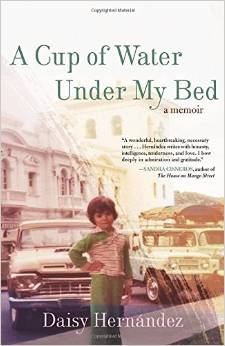 A Cup of Water Under My Bed: A Memoir
A Cup of Water Under My Bed: A Memoir
by Daisy Hernández
Beacon Press. 185 pages, $24.95
I TEACH a course in multicultural studies to graduate students in counseling, and I’m always on the lookout for first-person narratives written by authors of diverse backgrounds. I especially seek out memoirs that reflect multiple ethnicities and sexual orientations.
Daisy Hernández’ memoir A Cup of Water Under My Bed is an impressive compilation of essays that raise questions involving gender, race, ethnicity, immigration, and sexuality.
Hernandez, co-editor of Colonize This! Young Women of Color on Today’s Feminism (2002) and former editor of the magazine Color Lines, offers a kind of “girl’s own story” about growing up in a Cuban-Colombian family that has resettled in the U.S., ending up in New Jersey.
Hernández offers a deeply moving exploration of family and personal identity with a subplot on the role of language. We learn about her matrifocal family in which her mother and aunts teach her about love, men, sexuality, class, race, and spirituality. We’re introduced to the spiritual world of Santería—a hybrid faith with Christian, African, and Caribbean roots— through her father’s ministrations to his protector spirits and the Santaría practice of placing of a cup of water under one’s bed.
Her discussion about language and its relationship to identity is of particular interest. She describes the challenge of learning English not only as a language skill but also as a basis for one’s identity. To speak English rather than Spanish was to become an American, but also to lose an aspect of oneself. From Hernández’ vantage point, language has the power to colonize you, to make you a mouthpiece for a foreign influence whose effect is to disconnect you from your roots and your culture.
The author explores her queerness as well, which created a sense of otherness in relation to her family. Although the primary ties in her family were all with women, lesbian sexuality had not been factored into the equation by her mother or her aunts. Hernández documents her coming out as a bisexual woman, including her involvement with trans men (female to male) partners. The latter belong to a sexual minority whose growing prominence further complicates the picture of gender and sexual identity. This book will be of great interest to those who pay attention to the challenges of negotiating compound identities in our increasingly multicultural and diverse society.
________________________________________________________






